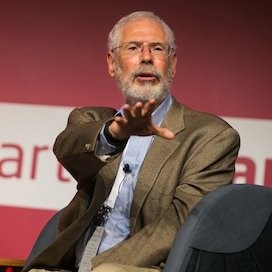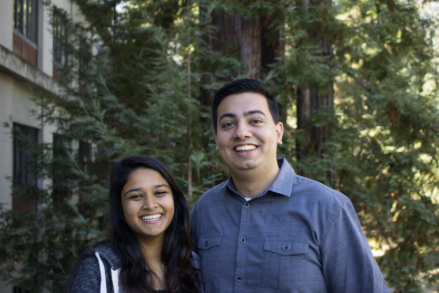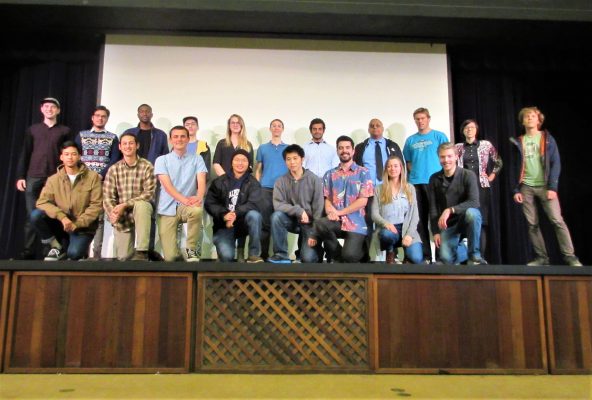Events
Words of Wisdom from Steve Blank, UCSC commencement speaker, June 2019

(Contributed)
June 18, 2019 — Santa Cruz, CA
(Photo: Steve Blank. Source: LinkedIn)
[Editor’s note: Steve Blank is a Silicon Valley entrepreneur based in Pescadero. Known by entrepreneurs and students as one of “The Godfathers of Silicon Valley,” Blank is the author of The Startup Owner’s Manual as well as several other books. The following is Blank’s UCSC commencement speech given on June 15, 2019.]
Congratulations to the graduates.
Today while we celebrate your college degree, it represents the end of one part of your life and just the beginning of the next.
You’ve just spent the last four years putting passion, energy and conviction into – your friendships, politics, social justice, partying and – every once in a while – your classes.
Now your time in the classroom is over and your real education is about to begin. Many of you will find yourselves colliding with a world driven – less by ideas, knowledge and the pursuit of truth – and more by money – ideology – and power.
So today, I’m going to offer you a glimpse of how the world outside of this esteemed institution really works. And offer some tips on how to be effective change agents for repairing the world.
I think it’s altogether fitting and proper that in a college named after Rachel Carson, to share four short stories of what happened when truth and justice faced money and power – in the seven years I served as a public official on the California Coastal Commission.
My first story is that The Smartest person in the room is almost never the most effective.
One of things I loved about being a coastal commissioner was how much I learned. Coming out of Silicon Valley and the tech world, I was a complete novice on how policy gets made. So, I had to read the Coastal Act, the Coastal Regulations, and enough law to understand the positions our staff took and what the applicants were contending. And each month I’d have to read through 100 staff reports to figure out how to vote. Deciding between the applicants, their lobbyists, the environmental community, the staff, the coastal act and the law.
Meanwhile, while I was reading everything, I noticed that one of the other commissioners was reading nothing, not the staff reports, not the coastal act, not the law. In fact, all he could do was count to seven.
And that ability to count to seven made him the most effective commissioner.
Why? Because out of 12 commissioners, seven is the number needed to win a majority in a vote.
While I was the master of the facts and data, he was calling in favors, cajoling others, and building a coalition to get the majority of commissioners to see the world his way.
So, my first lesson is – You don’t need to be the smartest person in the room to be the most effective. Being effective means not just mastering the facts but – figuring out how to move your agenda forward.
My second story is about the power of Misdirection over the truth
Magicians use misdirection all the time: they sweep off their top-hat, you fixate on it, and all of a sudden, their assistant standing next to them disappears.
I got to watch a magic act unfold before my eyes when real estate developers made eight office buildings totaling 1⁄4 million square feet — twice the size of a Wal-Mart — disappear. How?
The developers wanted to build office buildings in an area zoned for farmland. Traffic from this huge project would have filled local roads not designed for this density and would impact the public’s access to the beach. Given that on the face of it, this project violated all kinds of laws, how did these developers make it disappear – and get unanimous approval from the county’s Board of Supervisors?
Their solution was brilliant – and evil. They proposed that after building these eight office buildings, they would build a housing facility for 57 developmentally disabled adults. They convinced the dedicated, deserving and passionate parents of this group that this project was the only hope these families would ever have to secure housing for their children (neglecting to tell them they had located the housing for the disabled in a tsunami inundation zone).
Naturally these parents became vociferous advocates for the project. They brought their disabled children to the hearings and did exactly what the developers had hoped – with not a dry eye in the house, no one could see the project anymore. The developer had moved the attention from a project that violated local and state zoning onto a small and deserving group of individuals. It was heartbreaking. And it was world-class misdirection.
The lesson here is that misdirection is designed to distract you from the truth. Obscuring a fact-based argument with a faith-based one is what demagogues do – in policy and politics. See through it. Help others to see how this kind of misdirection distorts their perspectives.
My third story was about the day I learned to Follow the Money
One day all twelve of us coastal commissioners took a field trip out to a farm to look at a puddle.
An environmental group was suing a farmer over whether the big puddle that formed on his 400-acre farm after a rain was now a wetland. It took me awhile to learn that this distinction between a puddle and a wetland was worth a billion dollars.
The business model for real estate developers isn’t hard to understand – they buy farms and ranches then build houses and sell them off. And in California if you can build 1,500 houses on a 400-acre farm, that might be worth a billion dollars. Developers make their profit off the difference between the cost of the land and the net profit on the houses.
But one obstacle for California developers is that the Coastal Act says you can’t build on land that has been designated a Sensitive Habitat. So, if you’re a developer, having any land declared sensitive is a loss of potential revenue. In fact, it can kill the project. However, … there is one loophole in those rules — if you’re a farmer you can plow under anything.
So as a consequence, real estate developers are great farmers. They buy-out family farms for prices that far exceed what the farmers could ever get from selling their crops. And then they lease the land back to them so they can continue to farm. The developers invest in equipment so farmers can plant multiple crops each year, till each and every inch of their fields, and ensure those fields are perfectly level so no water can collect on the fields.
When I first ran into this I thought, “Wow what a great deal. The developers are great for the environment, they’re helping farmers by making all these improvements.
It took me a year and lots of looking at puddles on farms for the dim lightbulb to go on over my head. Real estate developers couldn’t care less about farming or the crops.
The developers were keeping the farmers plowing the fields to make sure no sensitive habitat would appear. And the day a developer got the zoning approvals, the bulldozers would show up to start building the houses that would bury the farm.
The lesson here was that when I was standing in the farm field, I wasn’t looking at a puddle – I was staring at a billion dollars- and I didn’t see it. So when you hear or see something that is too good to be true – follow the money. It’s usually a long and winding road.
My final story is: if you want to make change you have to learn to communicate and inspire others
In all these lessons, I’d be remiss if I didn’t mention the namesake of your school – Rachel Carson. You all study her work your first year here. You know she was a marine biologist at the U.S. Fish and Wildlife Service — only the first woman in the job — and she served as editor-in-chief of all its publications.
Her 1962 book, Silent Spring, launched the modern environmental movement.
The book’s title evokes a spring when all the songbirds died told the story of the damage caused by indiscriminate use of especially DDT, to control insects. It educated a mass audience, most who had never seen a scientific paper in their lives, about how these chemicals entered the food chain, accumulated in the tissues of animals and ultimately made their way up to humans.
DuPont and other chemical companies threatened Carson’s publisher as well as the New Yorker and Audubon Magazine unless their planned Silent Spring features were canceled but nevertheless, she persisted. The book was a moral call to arms for people to take personal action.
Rachel Carson wasn’t first to raise concerns about DDT, but her impact was to communicate scientific evidence in a way that the general public could understand – she used facts to inspire others to take action.
In naming this college the donors said, “Carson, like UC Santa Cruz, epitomizes love of the natural world, ethical judgment based on sound scientific principles, and the persistence and courage to create change.”
Change happens when you can educate and inspire others – when you can use facts to create faith in what’s possible.
For those of you who will continue in the sciences or research, the easy part will be to write papers for your peers. The harder part is how you’ll explain “inconvenient truths” to people who may not want to hear them. How will you rouse an audience to action?
Finally, why do public service?
My work on the Coastal Commission took four days of my week each month in public hearings – at times in exhausting 12-hour days. And I’ve sat on the boards of other local and national non-profits.
But why serve your community, state or country? For me, I volunteered my time because of a gift I received my first year in college.
On my first day of school in Michigan I met Michael Krzys, who one day would be the best man at my wedding. As we got to know each other, I pretty quickly realized that I had met my match, someone with even more curiosity, creativity and a wry sense of humor.
But as I got to know Michael, there was another, completely foreign part of him I didn’t understand. – It would take me another 30 years.
From the day I met him he had a commitment to public service that was deep, heartfelt, profound, unshakable and to me, mysterious and completely unfathomable. Even as a freshman, Michael already knew that his calling was to help others and to do so he was determined to become a public service lawyer.
It confused and unnerved me to know someone with so much certainty about the meaning and direction of his life. It couldn’t have been more different from mine.
After our first year our lives took different paths. When they would touch again, it would be in ways neither of us could have predicted.
I left school and joined the Air Force during Vietnam, and Michael and I kept in touch via letters – me telling him about adventures in the military, fighter planes, electronics and foreign countries. His letters to me explained that while he appreciated my dedication to national service, public service was the higher calling. Each of his letters ended with him reminding me that I was destined for a different career.
When I got back from Southeast Asia, Michael was in Law School. For my last year in the Air Force, I was stationed nearby. Every weekend I would drive down 185 miles to see my girlfriend and hang out with Michael. Over dinner we’d argue about politics, talk about how to best save the world, and he’d tell me what he was learning that week in his law school classes. I remember when he taught me the best way to understand an issue was to learn how to argue both sides of a case.
It didn’t take long before he was loaning me his last quarter’s law books to read each week at the airbase where I was keeping the world safe for democracy. While students in law school were hiding their Playboy magazine’s inside their law books, I’m probably the only guy who had to hide his law books from fellow airmen under a pile of Playboy magazines.
When I got out of the military, Michael was finishing up law school. A year later he and his new wife headed to the South to work for Georgia Legal Services.
I moved to Silicon Valley, and we kept up a sporadic correspondence, me trying to explain startups and Michael telling me about the world of civil rights and social justice for the poor.
If possible, it seemed like his excitement for what he was doing matched mine. I just didn’t understand why he did it.
For entrepreneurs, understanding why people dedicate their lives to working for non-profits is hard to fathom. Why work for low pay, on something that wasn’t going to deliver a product that would change the world?
Today, each time I see the staffs of those non-profits I support, I get a glimpse of that same passion, commitment and sense of doing right that I first heard my freshman year decades ago. For the best of them, it’s not a job, it’s a life-long calling. They remind me of what Michael might have become.
One fine California April day, three years in Silicon Valley and now into my second startup, I got a call from someone in Michigan who had been trying to track me down.
Michael and his wife were bringing some kids to camp, and he was killed in a head-on car accident with a drunk driver. His wife and the kids survived.
It took me a long time, but as I got older, I realized that life was more than just about work, technical innovation and business. Michael and others worked to preserve and protect the values that made life worth living. And while we were making things, they were the ones who were changing our society into a more just place to live.
There wasn’t a day that went by during my time on the Coastal Commission that I didn’t wonder what Michael Krzys would do. He was my model as a human being who found his own compass.
I always hoped that mine would point in the same direction.
Graduates, as you set out on your own extraordinary adventures, — remember — the measure of a life is not time or money. It’s the impact you make serving God, your family, community, and country. Your report-card is whether you leave the world a better place.
Carpe Diem. Seize the Day. Thank you very much.
[Note: Steve Blank’s talk starts at 27 minutes into the video.]
###
Tagged Steve Blank, UC Santa Cruz







